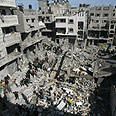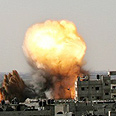

הרס הריסות בית מבנה עזה מלחמת עזה פלסטיני פלסטינים
Photo: AFP

רפיח הפגזה תקיפה רצועת עזה עופרת יצוקה הפצצה
Photo: AFP
Israel's fierce assault
on Gaza's Hamas rulers has destroyed at least $1.4 billion worth of buildings, roads, pipes, power lines and other infrastructure in already impoverished territory, Palestinian surveyors estimate.
Arab and Western countries will be called on to foot much of the bill to rebuild - which Palestinian economists say could take five years or more.
War in South
Hanan Greenberg and AP
Tanks shell downtown Gaza City, ground troops enter crowded Tel Hawwa neighborhood for the first time; sources say thousands of residents fleeing for cover
The Israeli military says it has bombed over 2,500 Hamas-linked targets since December 27, including 250 tunnels the militant group used to smuggle in arms as well as large amounts of weapon stockpiles and rocket launcher squads.
Even with the Israeli offensive going full throttle, the international community is starting to tackle the formidable postwar challenge.
Europe's top four fundraisers for the Palestinians - the foreign ministers of France and Norway, the European Union external relations commissioner and the international Mideast envoy - are meeting in Paris on Thursday to discuss Gaza's reconstruction and the possibility of holding a new donors' conference.
Another concern is whether a ceasefire deal will lift the blockade Israel and Egypt imposed on Gaza after Hamas seized the coastal strip in June 2007 and ousted the forces of Palestinian President Mahmoud Abbas, who now controls only the West Bank.
"You cannot rebuild Gaza without open borders," said Tor Wennesland, the top Norwegian diplomat in the Palestinian territories. Yet ending Gaza's lockdown will require compromises that seemed impossible before the Israeli offensive.
The humanitarian crisis is becoming more pressing every day, according to the UN and human rights groups.
Tens of thousands have been displaced and the vast majority of Gazans depend on food handouts. Power cuts are widespread and at least 250,000 Gazans have been without electricity since Israel launched its offensive, aimed at halting Hamas rocket fire at southern Israel.
Sewage levels are rising precariously in rickety reservoirs. With nearly 4,000 wounded, along with about 1,000 killed, hospitals are increasingly overwhelmed and the health system is close to collapse, aid groups warn. Thirteen Israelis also have been killed.
Israel has allowed in convoys of supply trucks most days during the offensive, but aid workers say that's not enough to alleviate the crisis. Even before the fighting, the blockade was pushing Gaza close to the edge.
Unemployment had risen to nearly 50 percent, with an Israeli export ban forcing virtually all of Gaza's 3,900 manufacturers to shut down, the UN said in December.
Cash was scarce because of restrictions on bringing in bank notes, 80 percent of drinking water was substandard, electricity intermittent and tens of millions of gallons of sewage were discharged into the sea every day because of insufficient treatment facilities.
"It was bad before, it's worse now, and it's not getting any better," said Maxwell Gaylard, the UN Humanitarian affairs coordinator for the Palestinian territories. "Civilians are bearing the brunt of this destruction of homes and infrastructure."
Palestinian economists say a renewed blockade after the fighting ends is unthinkable, especially since Gaza's smuggling tunnels - a lifeline that brought in consumer goods as well as weapons - have been largely destroyed.
"A continuation of the closure means the final death blow to Gaza,"said economist Mohammad Shtayyeh, who runs a Palestinian economic development council that serves as a liaison between the Abbas government and donor countries.
Even under ideal conditions, with borders open, rebuilding Gaza would take at least five years, he said.
4,000 houses destroyed, 16,000 damaged
World Bank officials say that with the fighting still raging, it's too early to assess damage. However, Shtayyeh's council and the Palestinian Central Bureau of Statistics have begun a first tally.Based on reports from 56 engineers, the development council said the fighting caused about $1.7 billion in damage in the first 15 days.
This includes $300 million in damage in the southern district of Rafah, on Gaza's border with Egypt, hard hit by bombings because of the smuggling tunnels there, Shtayyeh said.
About $135 million was in damage to houses and $35 million to infrastructure, he said.
The statistics bureau reported $976 million in damage and $408 million in lost trade, wages and other income in the first 17 days of the Israeli assault. About 4,000 houses were destroyed and 16,000 damaged, said director Luay Shabaneh.
He said 30 Hamas security compounds, 15 government ministries and the main government complex were demolished.
Earlier this week, Hamas' Cabinet secretary general, Mohammed Awad, told the militant group's Al Aqsa TV that about 1,000 residential buildings had been destroyed, and 25,000 damaged.
Abbas is planning to address an Arab League meeting next week in Kuwait, where he will likely appeal for help for Gaza.
West Bank-based Planning Minister Samir Abdullah said rebuilding Gaza will be impossible if Hamas keeps ruling the territory alone.
"It is a precondition that reconciliation take place and Gaza come under a legal authority," he said. "Otherwise, we can't do anything there ... And the economic situation will become some kind of Somalia."















